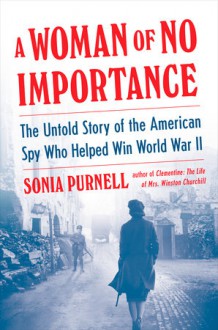
An outstanding story from start to finish. I listened to the audio and the narrator did an outstanding job, making an already riveting story one that I wanted to just sit and listen to, rather than serving as just a diversion while in traffic.
Virginia Hall, by any standard measure of time, accomplishment, daring, intelligence or bravery, was a heroine. Her gender makes no difference in this distinction, nor does her disability, but both render her accomplishments during WWII even more astounding.
Sonia Purnell does an excellent job chronicling the life of Hall, in spite of what she admits upfront was a daunting process of historical research in the face of archive fires, classified intelligence in multiple countries, and Hall's own ingrained reticence to discuss her work or accept accolades for her contributions to ending the war. Her speculations as to what might have happened during gaps in primary sources seem few, and the writing makes those speculations clear. She also doesn't just rely solely on chronicling Virginia's life, but covers quite a bit of the story of the French Resistance, especially in Lyon, during the Vichy government, and the Nazi take-over leading up to the invasion of Normandy.
The history is at times romantic in true Bond style, terrifying, and heartbreaking. The details of Vichy and Nazi interrogating techniques is NOT for the feint of heart, and the post-war years for Virginia were a mixture of recognition of her talents and accomplishments, and a disgusting record of 50's misogyny. I appreciated that the author made the effort to be accurate, not falling into the easy route of railing against all the discrimination and not giving time to those men in the intelligence and government sectors that stood up and gladly gave her the credit she earned and deserved. Purnell tries to be balanced, and I think she succeeds brilliantly, pointing out the CIA's mistakes and their own efforts to take responsibility for them.
I'm thankful I found this book, and I'm thankful Purnell wrote it, giving men and women around the world another authentic role model and hero to look to. I can't help but wonder, though, how Hall herself would view this fine work. I hope, in spite of her life-long secrecy and desire to remain unknown, she'd appreciate her life's achievements as the valuable legacy they are to future generations.

 Log in with Facebook
Log in with Facebook 







